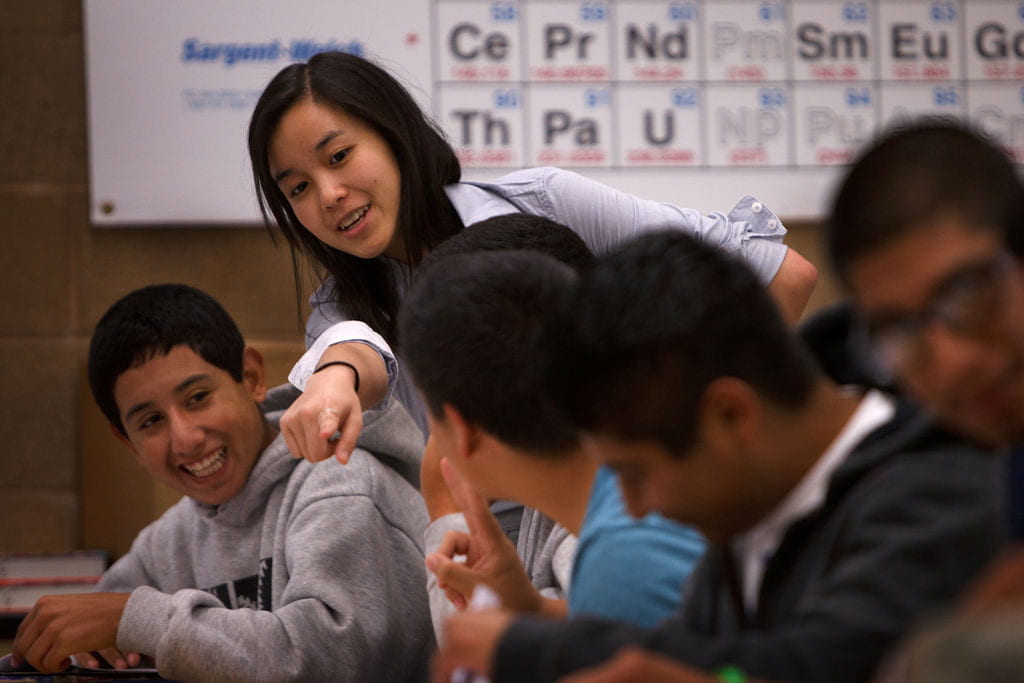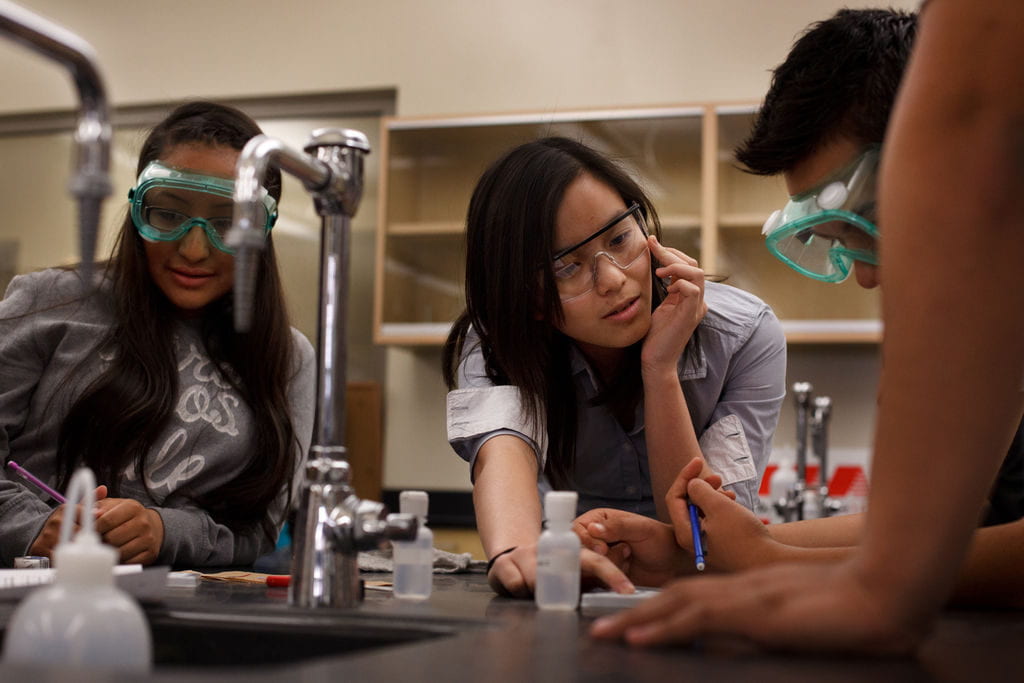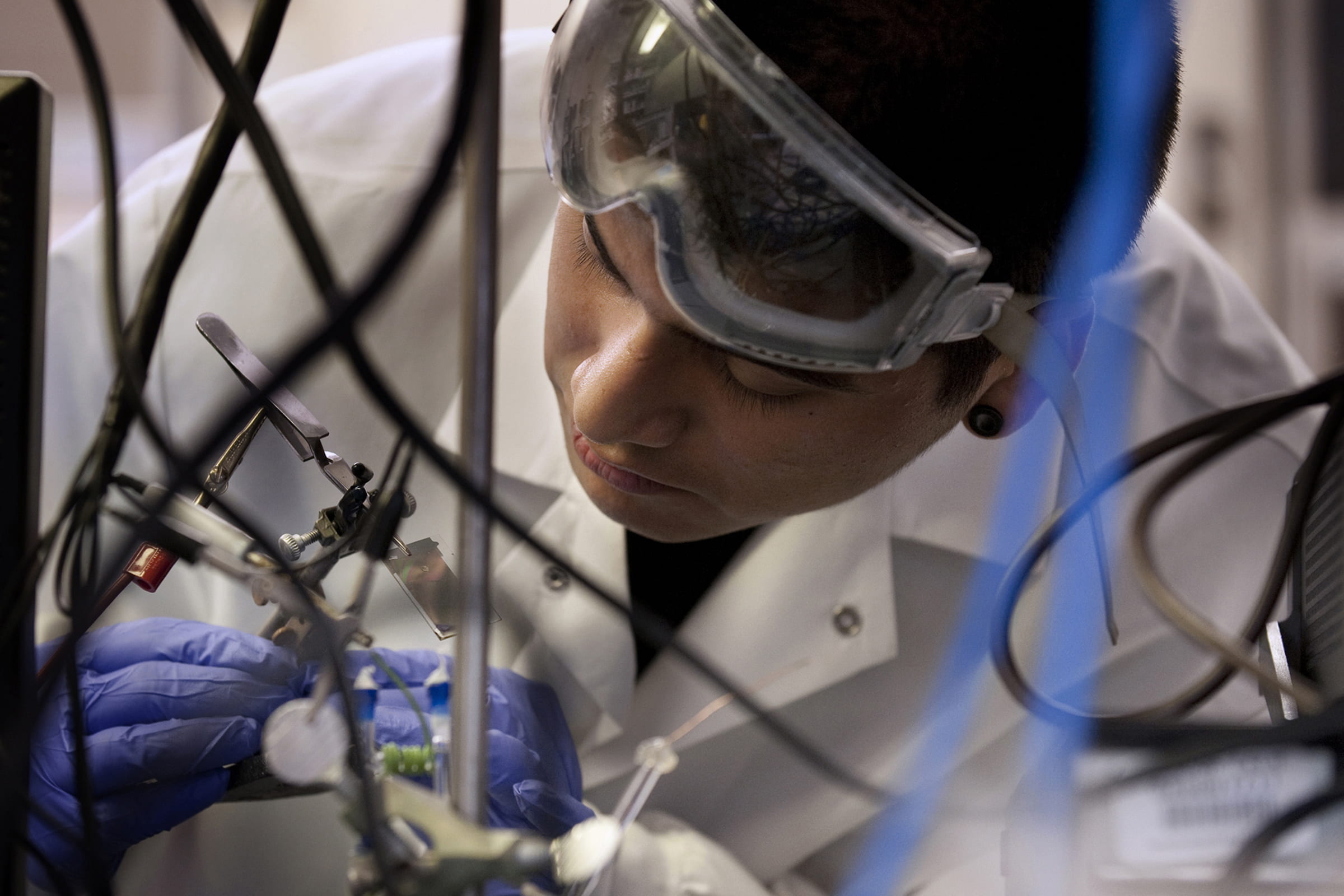Program fosters future science, math teachers
UCI program helps meet nation’s critical need for more – and better – math and science teachers.
When she enrolled at UC Irvine to study chemistry, Khanh Tran knew she wanted to pursue a career in education. Never mind that family and friends tried to steer her toward pharmacology and engineering. She’s happy in a classroom, doing things like explaining chemical reaction rates with over-the-counter antacids, a beaker of vinegar and a stopwatch.
“I really enjoy those lightbulb moments,” Tran says of students grasping science concepts. “It’s rewarding to help them gain more knowledge.”
She’s working toward a bachelor’s in chemistry and a teaching credential through UCI’s California Teach science and mathematics program. Over its course, Tran will complete at least 500 hours of fieldwork and apprentice teaching in local classrooms, honing her skills under the supervision of experienced middle and high school science teachers. This quarter, she’s finishing fieldwork at Santa Ana’s Godinez Fundamental High School.
In 2007, UCI was one of 13 universities in the nation awarded $1.4 million by the National Math & Science Initiative to develop dual bachelor’s degree and single-subject teaching credential programs modeled after UTeach at the University of Texas at Austin. UCI’s resultant Cal Teach effort aims, eventually, to produce 60 credentialed math and science teachers annually. The first cohort of 11 will graduate in spring of 2012.
Once a global leader in math and science education, the United States now ranks 25th in math and 21st in science out of 30 industrialized nations, according to a report from the Organisation for Economic Co-operation & Development. This concerns those in the scientific community such as Al Bennett, dean of UCI’s School of Biological Sciences.
“Kids through the sixth grade are little scientists; they’re very curious about the world and how things work,” he says. “For some reason, that curiosity gets beaten out of them, but we can help by educating highly qualified and motivated teachers who are passionate about math and science.”
An evolutionary biologist, he credits his eighth-grade science teacher for inspiring his love of the subject. “To a biologist, every living thing is fascinating,” says Bennett, a fellow of the American Academy of Arts & Sciences and the American Association for the Advancement of Science. “When you feel that way, it gets communicated to students even beyond what you’re doing in the classroom.”
Cal Teach addresses the growing need for skilled math and science teachers by making it possible for undergraduates to earn a math or science bachelor’s degree and teaching credential in just four years. The state’s traditional model has prospective teachers enroll in a one-year credential program after completing their undergraduate education.
The Cal Teach curriculum blends math or science subject matter and research-based teaching pedagogies, with a focus on readying students for the challenges of teaching in the state’s most disadvantaged schools. Upon graduating, students in the program are fully prepared and certified to start their teaching careers.
Rebecca Cordero, a Cal Teach junior majoring in mathematics, wants to counter the general dislike of the subject, which she thinks is fear-based. “When I tell someone what I’m majoring in, they go ‘ewww,’” she says. “What scares people most is that math is cumulative; everything builds on everything else.
“If you have an ineffective teacher one year, it can really mess you up and make it difficult to catch up. But when people have good math teachers, it helps them understand and like the subject.”
Through Cal Teach, Cordero has taught algebra to students at Santa Ana’s Carr Intermediate School and explained the science behind earthquakes and volcanoes to elementary students during a summer internship at the Discovery Science Center.
She grew up helping her younger sisters and classmates with math homework and looks forward to teaching professionally. When planning lessons, Cordero checks with her roommate, an anthropology major, to ensure that they’re engaging to nonexperts.
“I think math is so misunderstood,” she says. “Cal Teach is great at training you how to convey math concepts, such as the many different ways to solve an equation.”
Tran most appreciates the program’s emphasis on instructional methodology and how to work with California’s diverse student population.
“We’re learning teaching strategies for ESL and special-needs kids,” she says. “I feel like we’re all part of an educational movement, and I just want to put forth my best effort and achieve great things with my students.”




